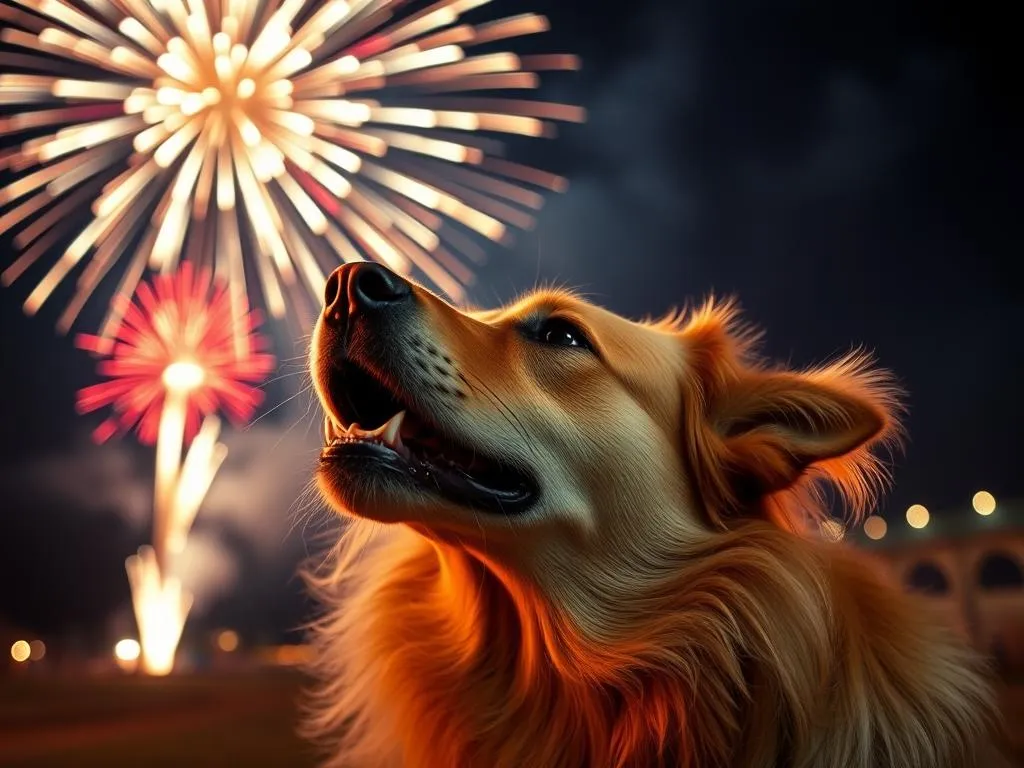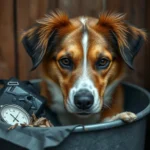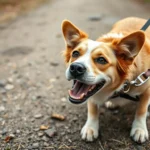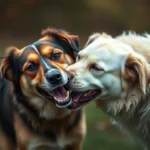
Introduction
Understanding dog behavior is crucial for any pet owner, especially when it comes to communication. One common behavior many dog owners notice, particularly during holidays and celebrations like Independence Day and New Year’s Eve, is their dogs barking at fireworks. This reaction can be alarming for both the dog and the owner, and it’s essential to explore the reasons behind this behavior. In this article, we will dive deep into why dogs bark at fireworks, discussing the underlying factors, signs of distress, and effective management techniques.
Understanding Dog Barking
What Barking Means
Barking is one of the primary ways dogs communicate. It serves various purposes, including alerting their owners to potential dangers, expressing excitement, or signaling distress. Different types of barks can convey different emotions:
- Alert Barking: A sharp bark to warn of intruders.
- Playful Barking: A series of yappy barks indicating excitement during play.
- Anxiety Barking: A repetitive, distressed bark often associated with fear or discomfort.
Understanding these distinctions helps owners interpret their dogs’ needs and emotions more effectively.
The Role of Instincts
Dogs are instinctual animals, and their behaviors often stem from their natural instincts. For example, many breeds have strong protective instincts that can manifest as barking. When faced with loud noises like fireworks, those instincts may trigger a response, leading to excessive barking.
Why Dogs Bark at Fireworks
Fear and Anxiety
One of the primary reasons dogs bark at fireworks is fear. Loud noises can be overwhelming for them, triggering a strong fight-or-flight response. Studies indicate that noise phobias affect approximately 30% of dogs, with many exhibiting signs of fear during fireworks displays. This fear can manifest in various ways, including barking, hiding, or attempting to escape.
Sensitivity to Sounds
Dogs possess an acute sense of hearing, which is significantly more sensitive than that of humans. While humans can hear sounds in the range of 20 Hz to 20 kHz, dogs can detect frequencies as high as 65,000 Hz. This heightened sensitivity means that fireworks, which produce loud booms and high-pitched sounds, can be particularly distressing for dogs, leading them to bark as a response.
Lack of Familiarity
Fireworks are not a common occurrence for most dogs. When they hear these unfamiliar sounds, it can trigger anxiety. Socialization plays a critical role in helping dogs cope with new experiences. Dogs that are not properly socialized may react more fearfully to loud noises, including fireworks.
Association with Negative Experiences
Past experiences can significantly shape a dog’s reaction to fireworks. If a dog has previously experienced a traumatic event during a fireworks display, such as being left alone or frightened by the noise, it may associate fireworks with that negative experience, leading to barking and distress in future situations.
Signs of Distress in Dogs
Behavioral Signs
When dogs are distressed by fireworks, they may exhibit various behavioral signs, including:
- Excessive barking or whining
- Pacing or restlessness
- Seeking comfort from their owner
Physical Signs
Physical manifestations of fear can be just as telling. Common signs include:
- Trembling or shaking
- Hiding in a corner or under furniture
- Rapid panting or drooling
Changes in Normal Behavior
It’s important to recognize that barking at fireworks may differ from a dog’s typical barking behavior. If a dog usually barks at strangers but becomes excessively vocal or distressed during fireworks, it’s a clear indication that something is wrong.
Managing Your Dog’s Fear of Fireworks
Preparation Before Fireworks
Taking proactive steps before fireworks events can make a significant difference in how your dog copes. Consider the following strategies:
-
Create a Safe Space: Designate a comfortable area in your home where your dog can retreat during fireworks. This space should be quiet, dark, and lined with familiar items like their bed or favorite toys.
-
Desensitization Techniques: Gradually expose your dog to recordings of fireworks at a low volume. Over time, increase the volume while providing positive reinforcement to help them associate the sounds with positive experiences.
During Fireworks
When fireworks start, there are several strategies to help calm your dog:
-
Use White Noise: Playing white noise or calming music can help drown out the sound of fireworks and create a soothing environment.
-
Stay Calm: Dogs can pick up on their owner’s emotions. By remaining calm and relaxed, you can help your dog feel more secure.
-
Provide Distractions: Engage your dog with toys or treats to distract them from the noise outside. Interactive toys or puzzle feeders can be particularly effective.
After Fireworks
Once the fireworks have ended, it’s essential to comfort your dog and reinforce positive behavior:
- Offer treats and praise for calm behavior.
- Avoid scolding or punishing your dog for their reactions, as this may exacerbate their fear.
Training Techniques
Desensitization and Counter-Conditioning
Two effective training techniques for managing a dog’s fear of fireworks are desensitization and counter-conditioning.
-
Desensitization involves gradually exposing the dog to the sound of fireworks, starting at a low volume and increasing it over time. This process helps reduce sensitivity to the noise.
-
Counter-Conditioning focuses on changing the dog’s emotional response to the sound. By associating the sound of fireworks with positive experiences, such as treats or playtime, dogs can learn to view fireworks as a less threatening occurrence.
Professional Help
If your dog’s fear is severe, it may be beneficial to seek help from a professional dog trainer or behaviorist. These experts can provide tailored strategies and support to help manage your dog’s anxiety effectively.
Alternative Solutions
Calming Products
There are several calming products available that can aid in managing your dog’s anxiety during fireworks. Some popular options include:
- Calming Collars: These collars release pheromones that can help soothe anxious dogs.
- Anxiety Wraps: Similar to swaddling a baby, these wraps provide gentle pressure that can have a calming effect.
Medication Options
In severe cases, medication may be necessary to help your dog cope with anxiety. Consult your veterinarian about potential options, including anti-anxiety medications. Never administer medication without professional guidance.
Training Classes and Workshops
Consider enrolling your dog in training classes focused on noise desensitization. These classes can provide structured environments for your dog to learn to cope with loud noises.
Conclusion
Understanding why dogs bark at fireworks is vital for any responsible dog owner. By recognizing the signs of distress and implementing effective management strategies, you can help your dog navigate their fear of fireworks. As pet owners, it’s our responsibility to create a supportive and safe environment for our dogs, especially during stressful situations.
By taking proactive measures, you can foster a sense of security and well-being for your furry friend. Remember, a little understanding goes a long way in ensuring that our dogs feel safe and loved, even when the world around them gets a little loud.









